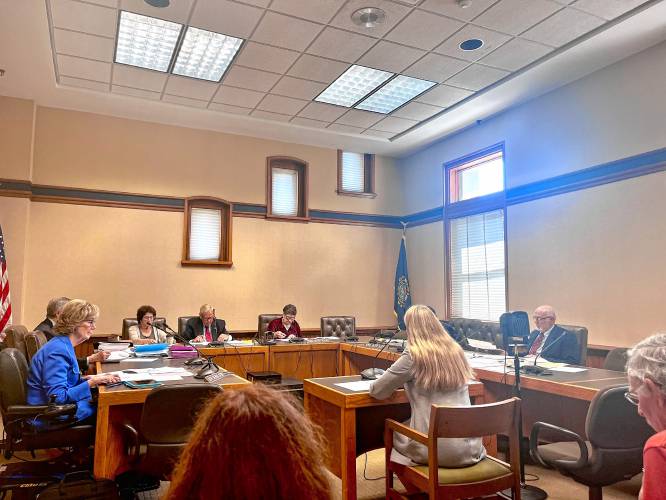State ethics committee continues consideration of conflict of interest rules despite Reardon opposition

Rep. Rebecca McWilliams speaks before the Legislative Ethics Committee about her request that it rule on to what extent a new law would limit Tara Reardon, her primary opponent in a state Senate race, if elected in November. Catherine McLaughlin—Monitor staff
| Published: 09-16-2024 5:36 PM |
An attorney for state Senate candidate Tara Reardon urged the Legislative Ethics Committee to dismiss a request to decide whether a new conflict of interest law would prevent Reardon from working or voting on bills where her spouse or his firm has lobbied.
Attorney William Christie argued that Rep. Rebecca McWilliams, who asked for the ruling and who recently lost a Senate primary to Reardon, lacked standing because she would no longer be a lawmaker when the new law goes into effect. He also said the committee couldn’t rule unless the specifics of a bill were on the table.
“This committee ultimately will have to have legislation before it and facts before to make a determination and not a determination based upon hypotheticals,” Christie said.
The committee neither dismissed McWilliams’ request nor committed to a response, only agreed to continue looking into it.
At the end of August, McWilliams asked the committee to interpret whether a new law would mean that lawmakers would be prevented from voting on bills where their spouse had advocated as a lobbyist. It had become a point of heated debate in the final weeks of the campaign especially between Reardon and the third candidate in the race, state Rep. Angela Brennan. The ethics committee declined to take up the matter before the primary.
Reardon did not speak at the hearing and declined to comment.
Continuing to look into her request doesn’t mean the committee will make a ruling on Reardon’s circumstances before she is sworn in if she wins the November election.
Several members, though, disagreed with Christie’s argument that they can’t provide guidance on what the law would mean for Reardon or others in the new year. Rather, they expressed an obligation to do so.
Article continues after...
Yesterday's Most Read Articles
“Ultimately, that’s the question, really, that needs to be decided: if you’re married to a lobbyist, do you have to recuse yourself?” said Ned Gordon, the committee’s chair and a former lawmaker. “I think there is some urgency, in that, on January 1, we’re likely to have that circumstance.”
Former House Speaker Donna Sytek noted that the new law is a sea change for all incoming lawmakers, not just Reardon, and that they would be well into the new session before a new legislative ethics committee could be seated and consider what the new law means.
“It is a dramatic departure from what has been the practice,” Sytek said. “To have the whole legislature come in without knowing anything about how this new law is going to be interpreted… it’s only fair to the parties to know in advance, to provide some guidance.”
That obligation was underlined by McWilliams.
“This truly is to clear the air” for both constituents and lawmakers, she said. “the request really is more and bigger than just one individual.”
After the hearing, McWilliams said she wants to see urgency from the committee on this question.
“We’re already hearing bills the second week of January,” she said. “There’s already committee work happening, and so you can’t enter a new session without providing guidance to our legislators.”







 Mullet madness: Young man who died in motorcycle accident remembered at local fundraiser
Mullet madness: Young man who died in motorcycle accident remembered at local fundraiser ‘Entire paradigm has to shift’: Majority of parents express support for phone ban, but predict rocky rollout
‘Entire paradigm has to shift’: Majority of parents express support for phone ban, but predict rocky rollout New Hampshire committee seeks to prevent domestic fatalities like murder-suicide in Berlin
New Hampshire committee seeks to prevent domestic fatalities like murder-suicide in Berlin ‘A little piece of everything I like’: New Pittsfield barbershop brings more than a haircut to downtown
‘A little piece of everything I like’: New Pittsfield barbershop brings more than a haircut to downtown
